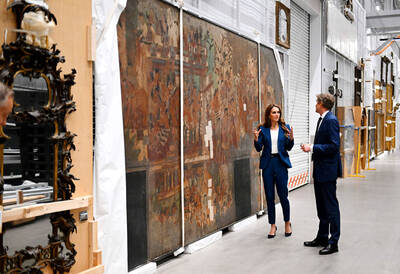Have you ever sent a nude selfie? The question draws a thick red line between generations, throwing one side into a panic while the other just laughs. And yet, as far back as 2009, that fount of moral wisdom, Kanye West, was advising how to stay safe.
“When you take the picture cut off your face / And cover up the tattoo by the waist,” he rapped in Jamie Foxx’s song Digital Girl.
As the pandemic forces relationships to be conducted remotely, more people than ever are resorting to the virtual exchange of intimacies. Last autumn, a poll of 7,000 UK schoolchildren by the youth sexual health charity Brook put the figure at nearly one in five who said they would send a naked selfie to a partner during a lockdown.

But for all the worries about the vulnerability of underage senders, it would be wrong to condemn the practice out of hand, according to New York Times columnist Diana Spechler, who argued that, in lockdown, nude selfies had become a symbol of resilience, “a refusal to let social distancing render us sexless.”
The selfies she and her friends were exchanging, she wrote, weren’t “garish below-the-belt shots” but pictures that were “carefully posed, cast in shadows, expertly filtered.”
In short, they were works of art and deserved to be considered as such.
Now publishing is getting in on the act, with Sending Nudes, a new anthology of nonfiction, short stories and poems reflecting on the pleasures and perils of baring all for the camera. Editor Julianne Ingles, who is also an artist, assembled the collection after putting out an open call for entries.
“Some were merely erotica and some were just about nudity. But we were looking for people who had something thoughtful and intelligent to say,” Ingles says.
Part of her reason for compiling the book, she says, is that she has sent nude selfies herself.
“I’m older — pre Internet — but I sent them and I have my own set of regrets,” she says. “It made me wonder about this need to be so self-exposing, and the psychological reasons why people do it.”
Her anthology is hot off the press in more ways than one, put together in three months, with the latest contribution dated December last year. All but five of the 16 contributors are women — and it’s a man, Michal Kamil Piotrowski, who has produced its most explicit text, an orgasmic concrete poem in the shape of a “dick pic.” It’s noticeable that the male contributors, fewer as they are in number, tend to shield themselves with genre — a piece of flash fiction, a science fiction fable — while the women are more confessional.
“When I sent nudes to men in my early adulthood,” says contributor Ellie Nova, “there was a mismatch between the sender and the receiver. For the men, I think, it was a brief thrill. But for me, it was an attempt to find connection and reassurance that, despite my darkest beliefs, I was lovable after all.”
Nova’s freeform memoir describes a student life in which the selfie becomes an act of ritualized self-sacrifice to the casualness of male desire, a ritual that is tangled up with self-harm.
“Before sending nudes, one must prepare,” writes Nova. “The body is edited. The body is made better / the hair on the head bleached; the hair on the underarms, legs and vulva removed; the face painted. The imaged cropped, smoothed, filtered, rendered black and white sometimes – when the pink shades seem too coarse. Even for a man with his hand round his cock. / I try to be artistic. I try to make it beautiful / the exchange.”
The unequalness of this exchange is picked up by teacher Rebekah LS in the anthology’s longest piece, Unthinkable, which chronicles a painful 14-year affair, conducted largely by selfie, with a man who had a pathological inability to commit. It opens with an innocent transatlantic conversation, which leads to “riskier pleasantries.”
Judged in terrestrial time, it becomes almost a steady relationship — three years have passed before the couple start exchanging nudes — but, when they finally find themselves in the same country, the doubts start to set in. Every time she’s about to end it, the illusion of intimacy is restored by a new set of selfies. It’s a painful unraveling, which ends: “I delete all of my nudes from our app so you can’t see them any more (I hope). I am left with no words.”
Poet and crime novelist Claire Askew is more positive: “Sending nudes is a new form of intimacy that can feel liberating, but it also makes a gift of our vulnerability,” she says.
In her poem 8 Ways to Lie in a Hotel Bed Alone, she imagines herself in a cheap hotel, accidentally sending a picture to a lover before checking where the recipient is: perhaps in the pub or standing in a chip shop queue, while she tries to settle on a hard hotel mattress.
“It’s a Virgin Mary pose I strike,” writes Askew, raising a recurrent theme: the artifice that conceals the nakedness. The nude selfie now has its own industry — including specialist photographic boudoirs — to help with this. Shyama Laxman conjures up a call centre worker whose other, night-time job is as Nudes Editor “£20 for minor fixes … £50 for morphing — your face on a porn star’s body.”
In a comic short story written in broad Scottish vernacular, Glasgow-based journalist Emma Grae pictures a woman with a turtleneck jumper fetish working her way through the paid-for selfie sites, from OnlyFans (“nudes, nudes, nudes and mair bloody nudes. I’m oan the wrang side o twenty-five) via AdultWork (“a bit o everythin”) to Pantydeal (“the biggest online marketplace for buying and selling used panties”), where she finally finds what she’s looking for.
“Naked bodies are so last century,” writes Grae in her introduction. “In a world obsessed with the classic nude, how dae folk develop quirky fetishes and how dae they get their kicks?” In its small way, Sending Nudes begins to collate an answer.

June 9 to June 15 A photo of two men riding trendy high-wheel Penny-Farthing bicycles past a Qing Dynasty gate aptly captures the essence of Taipei in 1897 — a newly colonized city on the cusp of great change. The Japanese began making significant modifications to the cityscape in 1899, tearing down Qing-era structures, widening boulevards and installing Western-style infrastructure and buildings. The photographer, Minosuke Imamura, only spent a year in Taiwan as a cartographer for the governor-general’s office, but he left behind a treasure trove of 130 images showing life at the onset of Japanese rule, spanning July 1897 to

One of the most important gripes that Taiwanese have about the Democratic Progressive Party (DPP) is that it has failed to deliver concretely on higher wages, housing prices and other bread-and-butter issues. The parallel complaint is that the DPP cares only about glamor issues, such as removing markers of Chinese Nationalist Party (KMT) colonialism by renaming them, or what the KMT codes as “de-Sinification.” Once again, as a critical election looms, the DPP is presenting evidence for that charge. The KMT was quick to jump on the recent proposal of the Ministry of the Interior (MOI) to rename roads that symbolize

On the evening of June 1, Control Yuan Secretary-General Lee Chun-yi (李俊俋) apologized and resigned in disgrace. His crime was instructing his driver to use a Control Yuan vehicle to transport his dog to a pet grooming salon. The Control Yuan is the government branch that investigates, audits and impeaches government officials for, among other things, misuse of government funds, so his misuse of a government vehicle was highly inappropriate. If this story were told to anyone living in the golden era of swaggering gangsters, flashy nouveau riche businessmen, and corrupt “black gold” politics of the 1980s and 1990s, they would have laughed.

Imagine being able to visit a museum and examine up close thousand-year-old pottery, revel alone in jewelry from centuries past, or peer inside a Versace bag. Now London’s V&A has launched a revolutionary new exhibition space, where visitors can choose from some 250,000 objects, order something they want to spend time looking at and have it delivered to a room for a private viewing. Most museums have thousands of precious and historic items hidden away in their stores, which the public never gets to see or enjoy. But the V&A Storehouse, which opened on May 31 in a converted warehouse, has come up